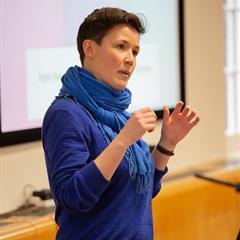Educating for Impact: How We Embed Sustainability into the Curriculum
Dr Rebecca Collins, Director of the University's Sustainability and Environment Research and Knowledge Exchange Institute (SERKEI), explains how the University of Chester is embedding sustainability across its curriculum to prepare students to be the change-makers our world urgently needs.

At the University of Chester, embedding sustainability into our curriculum is not just a strategic goal, it’s my personal passion. As someone deeply committed to environmental and social justice, I believe that education must do more than inform; it must inspire, empower and provide the tools to drive positive change. Our students deserve to graduate not only with academic knowledge but with the confidence and capability to be agents of change in an increasingly complex and fragile world.
This belief drives our work in Education for Sustainable Development (ESD). Across the University, colleagues are integrating sustainability into their teaching in creative, meaningful, and discipline-specific ways. The result is a rich tapestry of learning experiences that prepare students to tackle global challenges, whether they’re studying law, nursing, engineering, creative arts, or subjects more commonly associated with sustainability, such as geography or natural sciences.
Sustainability in Practice: Diverse Examples Across Disciplines
Our commitment to ESD is evident in the breadth of case studies emerging from across the University. Below are just some of the examples you will find at the University of Chester. There are many more examples across our Faculties, so I’d encourage any prospective students considering studying at Chester, and with an interest in sustainability, to search our wide range of courses and the modules available to study on these courses, before deciding to apply.
- Accounting and Finance: In a module called Sustainability in Banking, students explore how financial institutions are adapting to environmental risks and ESG (Environmental, Social, and Governance) regulations. They learn how sustainable finance is reshaping the sector and opening new career pathways.
- Business and Management: A Corporate Responsibility module explores the critical role of corporate responsibility in shaping sustainable business practices within a global context. Students appraise the impact of CSR (Corporate Sustainability Reporting) and ESG (Environmental, Social, and Governance) principles on sustainable growth and evaluate how technological advancements influence ethical decision-making and accountability.
- Fashion Design and Photography: In our Garment Production and Materials, Methods and Possibilities modules, students explore sustainable materials and non-toxic processes, rethinking traditional practices in their industries.
- Geography and Environment: In our Resilient Communities module, students conduct fieldwork along the North Wales coast, examining how communities adapt to flooding and climate risks.
- Languages and Cultures: Modules such as Encountering Contemporary Spain and Developing Intercultural Literacy use the UN Sustainable Development Goals to frame language learning within global responsibility.
- Law: Sustainability is embedded across multiple modules, from Principles of Property Law to Business Principles and Practice. Students engage in problem-based learning around environmental regulation and ESG (Environmental, Social, and Governance) practices. With nearly 60% of UK law firms anticipating increased demand for ESG-related advice, our curriculum ensures graduates are prepared to meet this evolving professional landscape.
- Nursing: Final-year nursing students develop innovations that improve practice and reduce environmental impact, often implementing these ideas in the NHS after graduation.
- Nutrition and Dietetics and Public Health: Modules like Dietetics and Public Health, and Theories and Principles of Public Health link climate change to nutrition and healthcare systems, preparing students to lead sustainable health initiatives.
- Politics and International Relations: Our Environmental Economics and Navigating Global Challenges modules delve into climate policy, degrowth, and environmental governance, preparing students to lead in policy and advocacy.
- Product Design: Product Design students work with industry partners to create commercially viable, socially responsible products using tools like the Design Compass.
- Psychology: In Animal Psychology, students explore the anthropogenic effects on nonhuman animals, including habitat destruction, pollution and rapid species adaptation. These discussions, framed by current research and news, foster a shared sense of urgency and empowerment.
Empowering Students to Lead
What excites me most is seeing students develop their own solutions to the sustainability problems they might be presented with. Whether through Carbon Literacy training, real-world industry briefs from external partners, or community-based research, they are not just learning, they are leading. They are asking difficult questions, proposing bold solutions, and imagining futures that are fairer, greener and more resilient.
This is the heart of our work: creating space for students to explore sustainability in ways that resonate with their values and ambitions. It’s about nurturing not just the skills needed for graduate employment in a rapidly changing world, but also those required for ethical leadership and global citizenship.
Looking Ahead
As sustainability continues to reshape industries, communities and global priorities, our curriculum must evolve too. At Chester, we are committed to keeping sustainability at the core of our educational mission, not as an add-on, but as a lens through which all learning is viewed.
I am proud to work alongside colleagues who share this vision and to support students who are ready to make a difference. Together, we are building a university community that doesn’t just respond to the challenges of our time but helps to shape the solutions.
Further Information
If you’d like to read further on the subject of embedding sustainability and green skills into the curriculum, Rebecca has written this piece for HEPI on how universities can join up agendas across subjects to prepare graduates for a sustainable future.